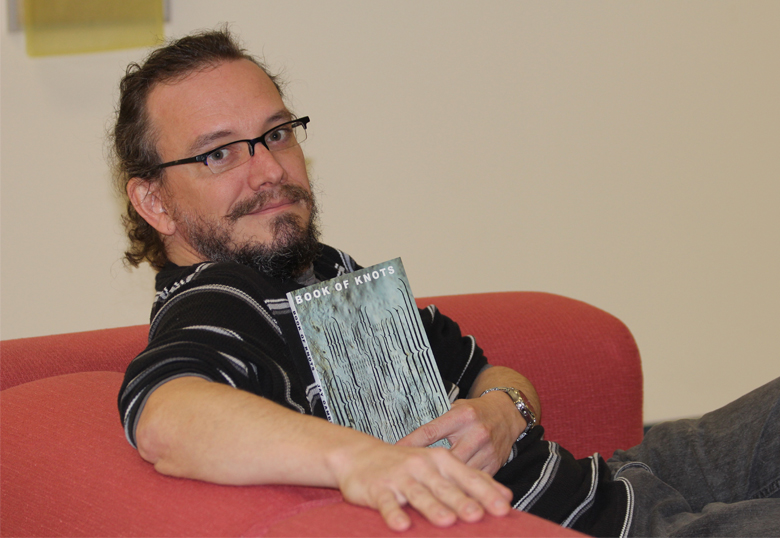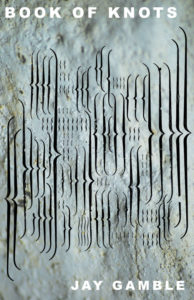
Interview by Shazia Hafiz Ramji
Jay Gamble is a poet, academic, and author of the long poem, Book of Knots, recently published by BookThug. The publisher says that Gamble’s poems “seek to engage with life’s failure, by building ‘a nothing’ out of something.”
As a poet and reviewer, it’s a treat to find a poet who acknowledges poetry’s fixation with failure, its philosophical influences, and the sheer sense of play that is necessary for writing. I had the pleasure of talking to Jay about creating out of “nothingness,” Hamlet, and procedural poetry.
When I first saw your book on BookThug, I was excited and relieved—a book of poetry about nothingness and failure! Such difficult obsessions! I imagined that the poetry would be minimal, self-reflexive, and dense, but I was surprised to find richness and formal variation. I think Book of Knots is a long poem fixated with the sites at which thought slips away or takes hold, and it is in these spaces that “nothingness” can be sensed and caught. I was deeply affected by the long sentences of the first section, “Bound”. These microfiction-like prose poems demanded a particular kind of attention. I found myself trying to read them all in one big swoop, while being aware of each thing’s relation to another thing. What is the relationship between the sentence, narrative, and poetry for you?
With “Bound”, I was working with the sentence as a grammatical unit, as a unit of “meaning-making”. I was attempting to exhaust the sentence, to stretch it until the “meaning” or narrative sort of dissipates into itself. I was working with—or, perhaps, against—Ron Silliman’s “New Sentence”, which relies heavily on parataxis, where the “absence” as it were, appears between two sentences. I was hoping to find the absence within a single sentence. So, in this sense, to return to your question, I think the sentence is vital to poetry. And, although the narrative component was of less interest to me in this piece, I do think narrative is also imperative: narrative may not be required in the writing of a poem, but I would argue that we understand poems through narrative. Poetry criticism really is the story of how we make meaning in a poem.
 The second section, “Gagged”, is noun-less and composed of fragments. I felt jarred reading “Gagged” after the overwhelming richness that is “Bound”. I found myself wanting to know the source of these fragments as Samuel Beckett’s “what matter who’s speaking?” resounded in my head in seductive, gloomy echoes. How did you generate this text?
The second section, “Gagged”, is noun-less and composed of fragments. I felt jarred reading “Gagged” after the overwhelming richness that is “Bound”. I found myself wanting to know the source of these fragments as Samuel Beckett’s “what matter who’s speaking?” resounded in my head in seductive, gloomy echoes. How did you generate this text?
I generated the text in this section in several ways. It actually began long ago in a Creative Writing workshop with Nicole Markotić at the University of Calgary. I was still obsessed with nothingness and was writing about that, but I kept using abstract nouns (it is quite difficult to write about nothing while using concrete nouns). Dr. Markotić got fed up with my submissions and said that she would fail me if I wrote another abstract noun. I was rather angry, and so in a fit, I said to myself, “Fine. I won’t use any nouns, then.” So I started removing the nouns from the work I had submitted. I was surprised at what emerged, and so I then started trying to write poems without nouns. I think Nicole knew I needed to be pushed, to be needled, in order to improve the writing. I think it worked. And it was Fred Wah who recommended the couplets for that section.
In the third section “In Violet”, I was reading between the lines—almost ahead of myself or behind myself at times. For example, in the stanza below, the associations for me jumped past the period so that I was paying attention to the sound for meaning, e.g. the idiom “home. Is where the heart [is]” and the Weather Network’s “severe wind chill warning” took precedence over the sentence fragment itself.
From her beautiful home. Is where the heart. Aches become less severe. Wind chill warning in.
While I was adjusting and readjusting, and forming and breaking new habits of reading, I became aware that you begin each sequence with “Inviolate” or “In violet” while the titles are numbered “In Violet I”, “In Violet II” and so on. Once again I felt the friction of narrative in poetry, this time tempered with the cadence and resonance of speech. Why did you choose to focus on speech? Are you challenging logocentrism?
That’s an interesting question. With “In Violet”, I was attempting to achieve a kind of absence through interruption, so your method of reading is precisely how I wrote the poem. The last word of each four-word group is then the first word of the next phrase. So, my intention was not really to focus on speech, though perhaps that emerges from the kind of interruptive effects the full stop has in the middle of a phrase. My aim was not specifically to challenge logocentrism, though perhaps this section does prioritize writing over the spoken.
The sections that follow are computer conversations with each other. You said that the fourth section “Ropes” is a computer dictation of the last section “And Chains” to another computer. Can you give more detail about the procedural techniques in these sections?
“And Chains” is a procedural poem: I took every instance of the word “and” in Hamlet (except when it included a proper name), used the “and” and the words on either side of it to string together four-word lines that then formed a link (or stanza) in the “chain.” In order to remove my agency as much as possible from the text, in order to let language speak, as it were, in “Ropes”, I then had one MacBook read “And Chains” to another MacBook, one stanza at a time. It was a procedure applied to another procedure. I did not change the text, except to put it into lines. That’s why a sad-face emoticon appears in “Ropes”.
In a book I was reading a while ago, Genesis Redux: Essays in History and Philosophy of Artificial Life, Scott Maisano writes:
“Descartes ‘laid the foundations’ for the pervasive metaphor of the body as a machine, that dubious honour might just as easily be ascribed to another seventeenth-century philosopher, Shakespeare’s Hamlet.”
Maisano points out that Hamlet refers to himself as a “machine” and speaks about himself in the third person, and that when he refers to himself as a “machine” he means “body.” Why did you choose Hamlet?
I chose Hamlet because it’s my favourite play, but also because it does tend to meditate on nothingness, to an extent. Nothing is mentioned thirty times in the play. Shakespeare spent a fair bit of time discussing nothingness or absence. In Lear, the king says to Cordelia, “Nothing will come of nothing. Speak again.” In some ways, that could be considered the driving principle of this entire text, the relationship between language and absence.
Book of Knots is a long poem. The formal variation in all five sections cohered for me as I felt led through a gradual eradication of subjectivity; from the detailed and personal-sounding prose of “Bound” to the deleted subject in “Gagged”, all the way to the machine conversation between the last two sections “Ropes” and “And Chains”. How did you decide to write a long poem, as opposed to, say, a series of five poems, or many shorter poems? Did the sections develop during the editorial process?
I will admit that I actually look at this as a life-long poem, one that will continue over several volumes. Taken together, the titles of each of the sections read, “Bound, gagged in violet ropes and chains.” This is the beginning of another exhaustive sentence like the ones that appear in “Bound” that will then continue over as many volumes as I can get written. The sections, then, were integral to the construction of the text itself as opposed to something that emerged later.
Thanks very much for taking the time to read the book and for your excellent, insightful questions.
Shazia Hafiz Ramji is the incoming poetry editor for Prism international. Her poetry was shortlisted for the 2016 National Magazine Awards and is forthcoming in Canadian Literature and filling Station. Her first chapbook is Prosopopoeia (Anstruther Press, 2017). She was co-editor for the “Intersections” issue of Poetry is Dead and has been a guide for Poor Yoricks’ Summer and Sacred Jest, groups dedicated to reading Infinite Jest by David Foster Wallace. She lives in Vancouver, BC.